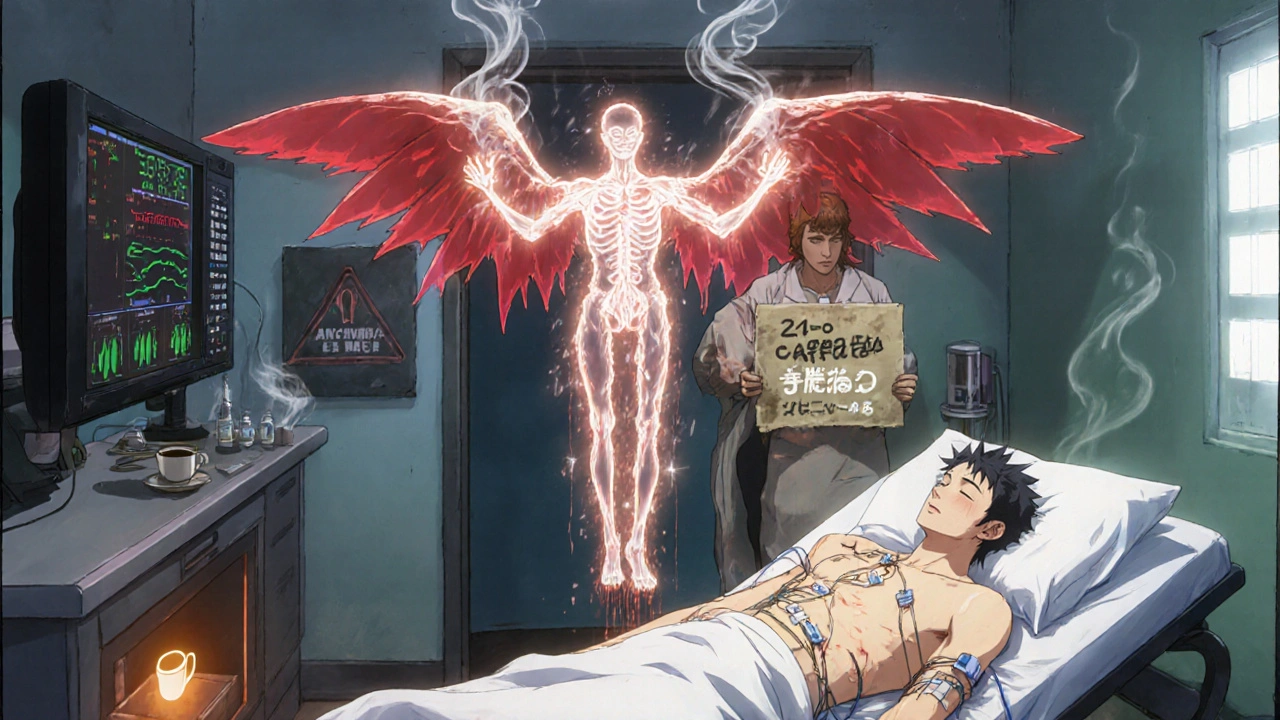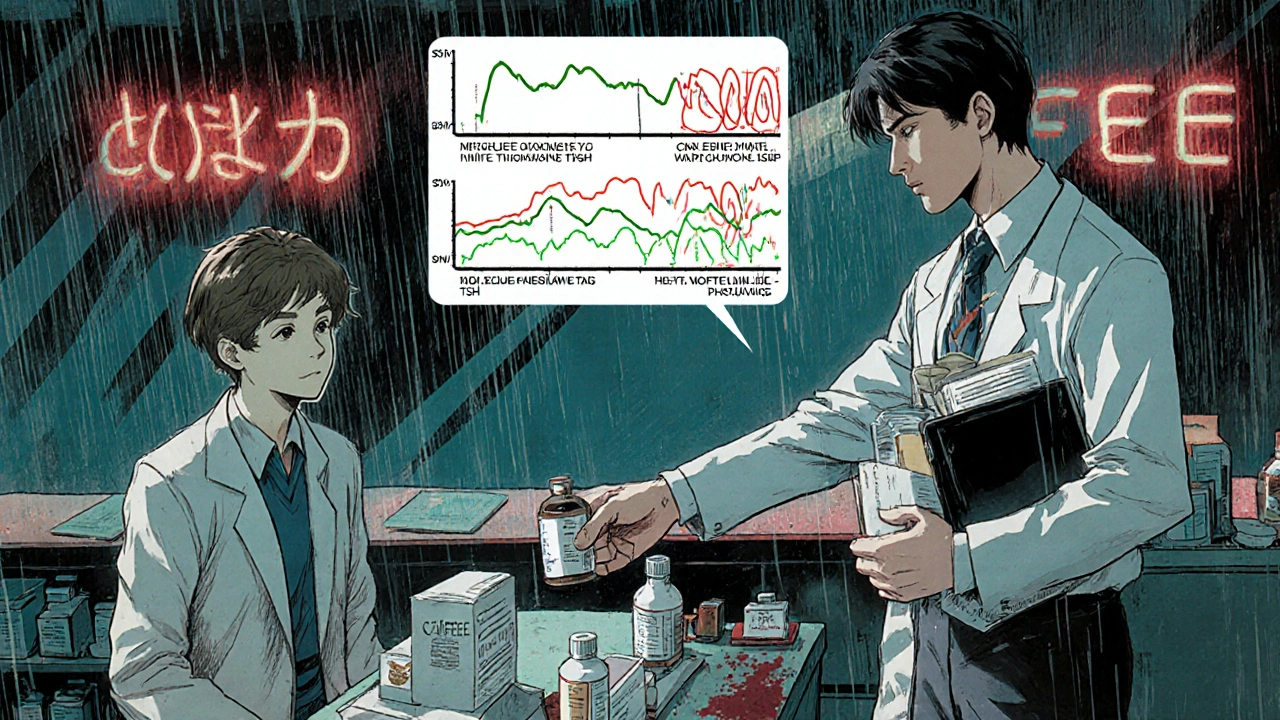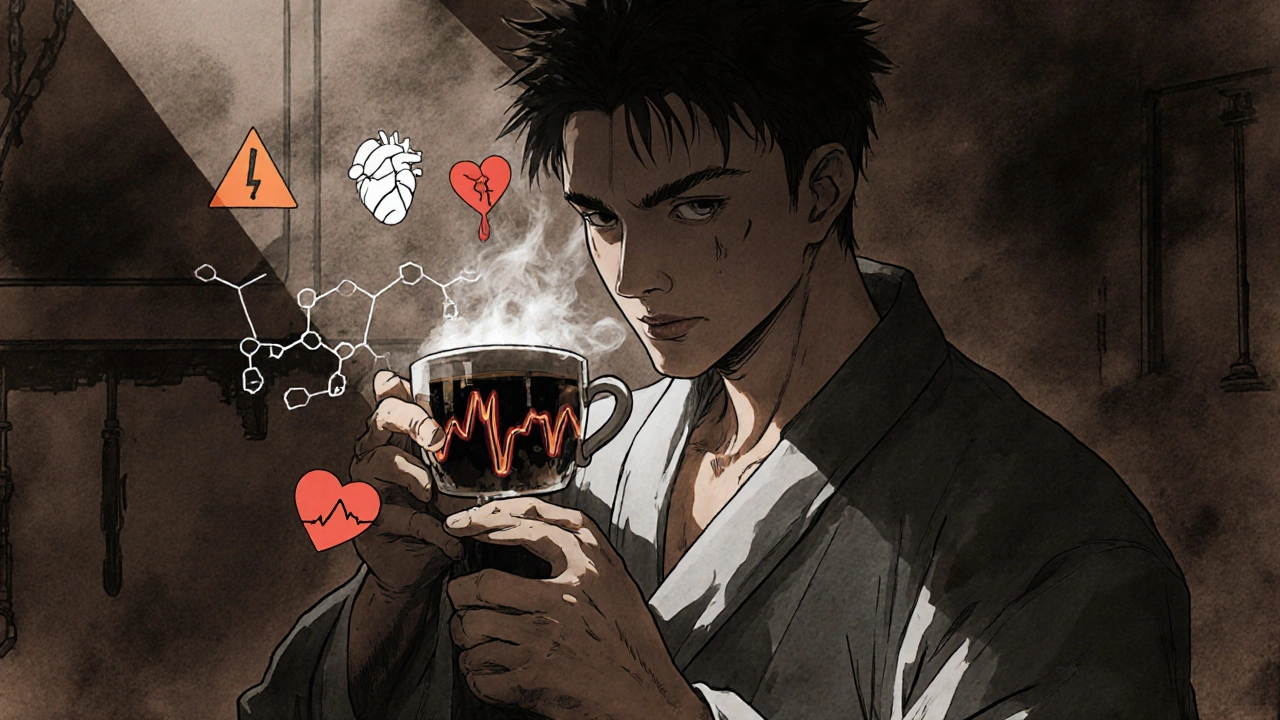Medication-Caffeine Interaction Checker
Check Your Medication Interaction
Most people don’t think twice about grabbing a cup of coffee before taking their morning pills. But what if that coffee is quietly making your medication less effective-or worse, turning it into a health risk? Caffeine isn’t just a pick-me-up. It’s a powerful chemical that interacts with more than 120 medications, and these interactions aren’t theoretical. They’re happening every day in kitchens, pharmacies, and emergency rooms across the country.
How Caffeine Changes How Your Body Handles Medications
Caffeine doesn’t just buzz through your system like sugar. It gets processed by the same liver enzyme-CYP1A2-that breaks down about 1 in 10 of the drugs people take daily. When caffeine hangs around because you drink it regularly, it clogs up that enzyme. That means your medication doesn’t get broken down as fast. It builds up. And when that happens, side effects get worse.
But it’s not just about slowing things down. Caffeine also blocks adenosine receptors in your brain and heart. That’s why it keeps you awake. But it’s also why it can cancel out the effects of heart drugs like adenosine and dipyridamole. If you’re scheduled for a stress test and you had a cup of coffee that morning, your results could come back useless. You’ll have to reschedule. And if you’re on a seizure medication, that same blockage can lower your seizure threshold. One study found patients had 18-35% more seizures when they drank coffee with their pills.
Medications That Can Go Wrong With Caffeine
Not all drugs react the same way. Some become stronger. Others become weaker. Here’s what actually happens with common prescriptions:
- Warfarin (Coumadin): Caffeine slows its breakdown. INR levels can jump 15-25% within a day. That means your blood takes longer to clot. A small spike in caffeine intake can land you in the ER with internal bleeding.
- Levothyroxine (Synthroid): Coffee reduces absorption by 25-57%. One patient reported their TSH level jumped from 1.8 to 4.5 after years of stability-until they started waiting 60 minutes after taking their pill before drinking coffee.
- SSRIs like fluvoxamine (Luvox) and escitalopram (Lexapro): Caffeine cuts absorption by about 33%. You might feel like the medication isn’t working, but it’s not your brain-it’s your coffee.
- Tricyclic antidepressants like amitriptyline: Caffeine makes these drugs stick around longer. Plasma levels can rise 20-40%. That means more dizziness, dry mouth, fast heartbeat-and worse, increased risk of heart rhythm problems.
- Stimulants like Adderall or pseudoephedrine: This combo is dangerous. Heart rate can jump 20-35 beats per minute. Blood pressure spikes 15-25 mmHg. People report feeling like their chest is going to explode. It’s not anxiety-it’s pharmacology.
- Diabetes medications with pseudoephedrine: Caffeine + decongestant = blood sugar spikes of 15-25 mg/dL. For someone managing diabetes, that’s a recipe for hyperglycemia and ketoacidosis.
- Seizure medications (carbamazepine, phenytoin, valproate): Caffeine lowers seizure threshold. Even one cup can tip the balance in vulnerable people.
What About Decaf Coffee?
Many people think switching to decaf solves the problem. It doesn’t. Decaf coffee still has 2-15 mg of caffeine per cup. For most people, that’s harmless. But if you’re on a medication where even small changes matter-like warfarin or levothyroxine-that’s enough to cause trouble. One patient on Reddit said they switched to decaf and still saw their INR climb. It wasn’t until they stopped coffee entirely that things stabilized.

Timing Matters More Than You Think
It’s not just about whether you drink coffee. It’s when.
The Endocrine Society says take levothyroxine on an empty stomach and wait at least 30-60 minutes before drinking coffee. That’s not a suggestion-it’s a protocol backed by clinical data. For warfarin, consistency is key. If you usually drink two cups a day, keep it at two. If you suddenly switch to four, your INR will swing. The American Heart Association recommends capping caffeine at 200 mg per day (about two 8-oz cups) if you’re on blood thinners.
For cardiac stress tests, the American College of Cardiology is clear: no caffeine for 24 hours. That includes tea, energy drinks, chocolate, and even some pain relievers that contain caffeine. One patient on HealthTap rescheduled their test after having one cup of coffee. The results were inconclusive. They lost a day of work and paid for another appointment.
After taking pseudoephedrine (common in cold meds), wait 4-6 hours before caffeine. For antidepressants, avoid caffeine within an hour before or after taking your pill. The window matters. And it’s different for every drug.
Red Flags: When to Call a Doctor
Most interactions are subtle. But some are urgent. If you’re on any of these medications and you start experiencing:
- Heart rate over 120 bpm
- Systolic blood pressure above 180 mmHg
- Difficulty breathing
- Confusion, vision changes, or loss of coordination
- Twitching, rigid muscles, or shaking
- Worsening depression or suicidal thoughts
- Seizures or altered mental state
Stop caffeine immediately and get medical help. These aren’t side effects you can tough out. They’re signs your body is overwhelmed.

What You Can Do Right Now
You don’t need to quit coffee. But you do need to be smart.
- Check your medication’s leaflet or ask your pharmacist: "Does this interact with caffeine?" If they say no, ask again. Many still don’t know.
- Write down your daily caffeine intake: coffee, tea, soda, energy drinks, chocolate, and even some painkillers.
- Separate your medication and caffeine by at least 1 hour before or 2 hours after.
- Keep a journal for two weeks: note your doses, caffeine intake, and how you feel. You might spot patterns your doctor misses.
- If you’re on warfarin, levothyroxine, or psychiatric meds, stick to the same amount of caffeine every day. Fluctuations are dangerous.
Pharmacists now have caffeine interaction alerts built into their systems. But if your doctor doesn’t ask about your coffee habit, they’re missing half the picture. Bring it up. Even if it feels silly.
The Bigger Picture
Over 150 million Americans take both caffeine and prescription drugs. That’s not a coincidence-it’s a public health blind spot. These interactions cause 2.8% of all adverse drug events in adults over 50. That’s tens of thousands of hospital visits every year. And $1.2 billion in preventable costs.
The FDA just added caffeine warnings to 15 new drug labels in 2024. NIH is funding research on caffeine’s effect on newer blood thinners like Eliquis. Hospitals are rolling out electronic alerts. But none of that matters if you don’t know your own habits.
Your coffee isn’t the enemy. But treating it like harmless background noise? That’s the real risk.

16 Comments
Ezequiel adrian November 19 2025
Bro i took my levothyroxine with my morning latte for 3 years and never thought twice 😅 now my TSH is a rollercoaster. Switched to water. Life changed. 🤯
Joe bailey November 21 2025
This is one of those posts that makes you feel like you’ve been living in a fog. I had no idea coffee could mess with my SSRIs like that. Thanks for laying it out so clearly - I’m switching to decaf tea now and waiting 90 mins after my pill. Small change, huge difference. 💪
Amanda Wong November 22 2025
Oh please. This is just Big Pharma scaremongering wrapped in a caffeine-shaped package. People have been drinking coffee with pills since the 1950s. If your medication breaks because of a cup of joe, maybe the drug was poorly designed. Also, I take warfarin and drink espresso daily. My INR is perfect. Your data is flawed.
Stephen Adeyanju November 23 2025
I had a seizure last year and my doctor said it was the coffee I had with my carbamazepine. I didn't believe him until I stopped drinking it and boom no more episodes. Now I drink tea. Still got my buzz. Still got my brain. Win win
james thomas November 24 2025
Let me guess the author works for the coffee industry and this is a psyop to make people think their meds are dangerous so they buy expensive decaf alternatives. Also I'm pretty sure the FDA is just a front for Big Tech and they're using this to track your caffeine intake through your smart fridge. Wake up sheeple
Asia Roveda November 26 2025
Of course this is an American problem. In Europe we don't have this nonsense. We take our pills with water and move on. This over-medicalization of everyday life is why your healthcare system is a dumpster fire. Also why are you so obsessed with coffee? It's just a drink.
Micaela Yarman November 28 2025
As a pharmacologist trained in India and currently practicing in Boston, I must emphasize that the CYP1A2 enzyme pathway is among the most well-documented in clinical pharmacokinetics. The interaction is not speculative - it is quantifiable, reproducible, and clinically significant. Patients who disregard this risk are not being "independent" - they are being statistically vulnerable. The data is clear. The science is settled.
Sanjay Menon November 28 2025
It’s fascinating how we’ve elevated caffeine from a simple alkaloid to a cultural icon while simultaneously pathologizing its biochemical effects. The irony is thick: we praise mindfulness, yet we gulp down espresso like it’s a sacrament. Perhaps the real issue isn’t the drug interaction - it’s our inability to pause, reflect, and simply… breathe. Or maybe just drink tea.
Cynthia Springer November 30 2025
I’ve been on levothyroxine for 12 years and never knew about the coffee interaction. I’ve been drinking my coffee 10 minutes after taking my pill. My TSH has been fluctuating between 2.1 and 4.8 for months. I just changed my routine - waiting 60 minutes. I’ll retest in 6 weeks. If my levels stabilize, I’m writing a thank-you letter to this post. Thank you for the clarity.
Brittany Medley December 1 2025
Just want to add: if you're on warfarin, don’t just avoid coffee - avoid green tea, grapefruit juice, and cranberry juice too. And if you're on SSRIs, remember that chocolate has caffeine too. A single dark chocolate bar = 20-30mg. That’s enough to interfere. Keep a log. Your pharmacist will thank you. And your future self will too.
Marissa Coratti December 2 2025
While the pharmacokinetic data presented here is indeed compelling and aligns with peer-reviewed literature from the Journal of Clinical Pharmacology and the American Journal of Health-System Pharmacy, I would like to extend the discussion to include the psychosocial dimension: the ritual of morning coffee is not merely a biochemical event but a deeply embedded cultural and emotional anchor for millions. To abruptly remove it without offering alternatives - mindfulness practices, herbal infusions, structured routines - risks triggering non-adherence not because of ignorance, but because of loss. We must treat this not just as a drug interaction, but as a behavioral health intervention.
Rachel Whip December 4 2025
My dad was on amitriptyline and drank 3 cups a day. He kept getting dizzy and his heart would race. He thought it was aging. We switched him to decaf and waited 2 hours after his pill. He hasn't had a dizzy spell in 8 months. This isn’t hype. It’s science. Please, if you’re on anything mental health-related - listen. Your brain will thank you.
Ali Miller December 5 2025
AMERICA IS WEAK. In Russia, we take our meds with vodka and coffee and still run marathons. You people are too soft. This post is a joke. Also I saw a guy on TikTok say caffeine cures depression so I guess I'm fine. 😎
JAY OKE December 7 2025
Just read this after my cardiologist told me to cut caffeine. I thought he was being extra. Now I get it. I stopped coffee for 3 days and my palpitations vanished. I’m switching to herbal tea. Not because I’m scared - because I’m smart.
Deborah Williams December 8 2025
It’s funny how we treat caffeine like a villain when it’s just doing what it’s supposed to do - stimulate. The real villain is the system that gives us 120 medications and expects us to memorize their interactions with breakfast. We’re not pharmacists. We’re humans trying to survive. Maybe the problem isn’t the coffee… it’s that we’re expected to be our own pharmacists.
Kaushik Das December 9 2025
As someone from India where chai is life, I used to take my blood pressure meds with masala chai. Turns out, even the small caffeine in it spiked my BP. Now I drink my chai 3 hours after my pill. My BP is stable. Chai is still my soul. Just… not at the same time. 🫖❤️